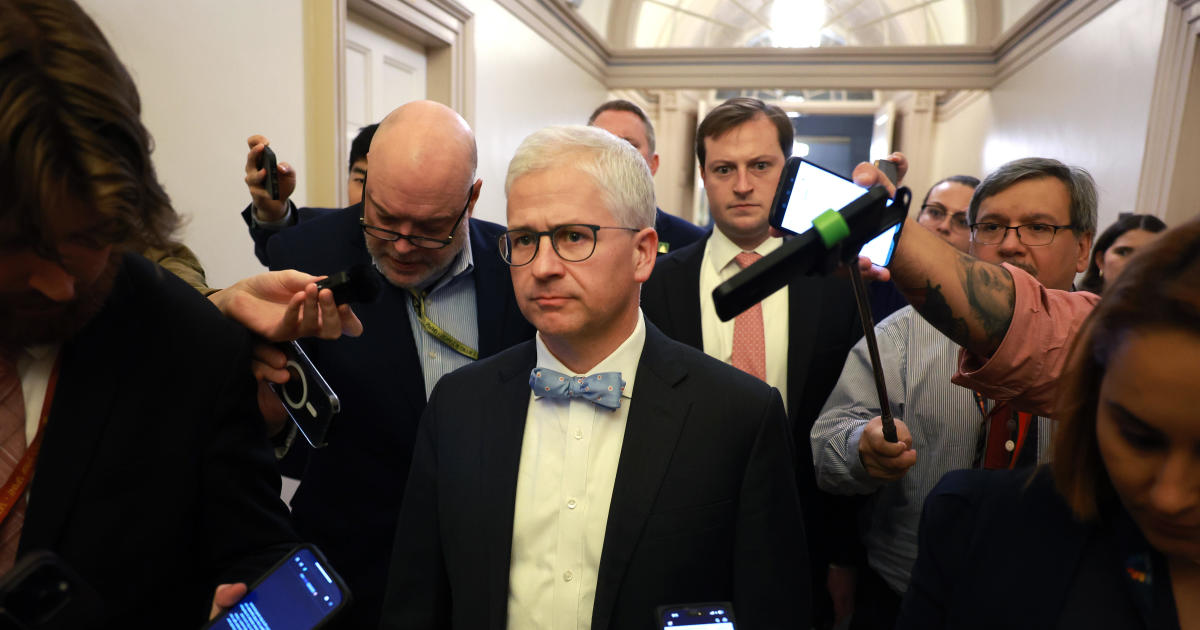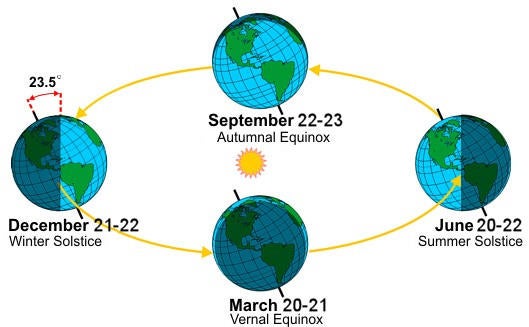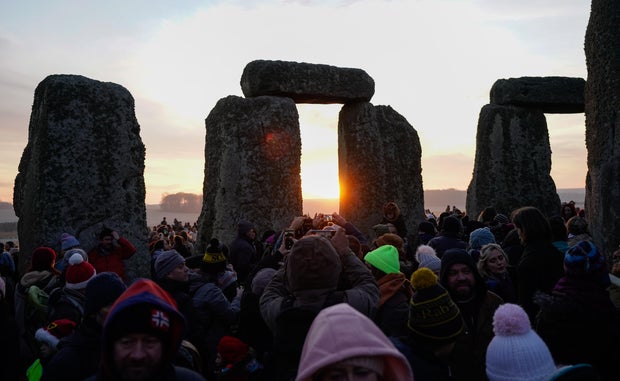CBS News
House is heading toward “nuclear” war over Ukraine funding, one top House GOP leader says

There’s a “50-50” chance of a government shutdown in early March, says House Financial Services Chairman Patrick McHenry, of North Carolina, and it’s House Speaker Mike Johnson’s fear of being ousted that will determine the outcome. And at the same time, McHenry says the House is heading to a procedural “nuclear” war over funding for Ukraine.
“I think the odds [of a shutdown] are 50-50 at this point,” McHenry, Republican of North Carolina, told CBS News on “The Takeout” this week. “This is a preventable disaster…Had we done this in November and December, the policy would be about the same, maybe a little bit better than it is now.” But the politics would be much better than they are now,” he added.
McHenry said Johnson is still adjusting to the difficulties of leading a small and restive GOP majority. Fear of losing his speakership stalks all shutdown scenarios, he said.
“All the speaker has to do is allow the Appropriations Committee to go get a deal,” McHenry said. “We will have a deal by March 1 and March 8 if we can allow just momentum to occur. If the speaker wishes to stop it for whatever reason, we’ll probably have a government shutdown. It will come down to the speaker’s decision on whether or not to just fund the government and get on with the deal.”
Congress faces two funding deadlines – March 1 and March 8 – to keep all governments services operating. The House of Representatives is in recess until Feb. 28. “Instead of taking action, Republicans on the Hill went on a two-week vacation,” President Biden said in a social media post on Monday. He has been urging House Republicans to pass national security funding, and specifically aid for Ukraine, which has been at the center of House gridlock.
Johnson and Democratic Senate Majority Leader Charles Schumer have already negotiated overall spending amounts for defense and domestic programs. All that remains are specific allocations under individual spending bills – and the political backlash that may come from hard-right House Republicans. McHenry said Johnson’s fear of that backlash could trigger a shutdown.
“[If] it’s fear of the deal that drives him, [that] will then result in a government shutdown,” McHenry said. “What I believe is, we will get higher spending and less policy as a result of the government shutdown.”
“You can either die as speaker and worry about them taking you out, or live every day as your last.”
McHenry said Johnson has every reason to fear being ousted.
“It is a real and legitimate fear because the last guy was taken out,” McHenry said before offering something akin to advice to Johnson. “You can either die as speaker and worry about them taking you out, or live every day as your last. Get something out of it. If you lead and get big things done, your reputation enhances. Your ability to get the next deal done is enhanced. The view from the public, while not perfect, is better if you take action than if you sit and dither.”
McHenry was instrumental in securing the speakership for former GOP Speaker Kevin McCarthy of California, and he remains bitter that eight House Republicans teamed with all House Democrats to remove him from the speakership in October – forcing McHenry to serve as a temporary speaker while Republicans stumbled through a series of votes and failed candidacies before settling on Johnson.
“We went through five choices and Mike Johnson’s the fifth choice,” McHenry said. “He has not been around these leadership decisions. He’s had a really tough process. We’ve thrown him into the deepest end of the pool with the heaviest weights around him and (we’re) trying to teach him how to learn to swim. It’s been a rough couple of months.”
McHenry said House Republicans remain disorganized in the wake of McCarthy’s departure.
“[McCarthy] was highly successful in the 10 months of his speakership,” McHenry said. “We didn’t have a single failed rule. Since then we’ve had five rules fail, which is a terrible mark for a majority.”
The House typically functions at the direction of the majority party. It sets the legislative agenda and enforces the rules under which bills are debated.
“If you’re in charge, you dictate the terms of debate. If you don’t pass that rule, you have, in essence, handed the House floor over to the minority party to do what they will. We did it zero times under Kevin McCarthy’s leadership. Since then, we’ve done it five times.”
Sizable House majority supports Ukraine, Israel aid bill, but Johnson is standing in the way, says McHenry
McHenry also said there’s a sizable majority of House Republicans and Democrats who support the Senate-passed national security bill that includes military aid to Ukraine, Israel, and Taiwan.
“They support 80 to 90% of what’s in the bill,” McHenry said. “About two-thirds of the House is of that opinion. It will get done. It will just be a question of how it gets done and how long it will take to get done.”
But the current impediment, McHenry said, is Johnson.
“What is axiomatic about the House is that any speaker can stand in the way of the majority will on the House floor for a period of time —but not permanently,” McHenry said. “My hope is that the speaker will come around to seeing this in a very sensible way.”
Absent Johnson relenting and allowing a vote on the Senate bill, McHenry said two obscure parliamentary maneuvers could circumvent Johnson – a discharge petition or defeating the previous question. Both would require Democrats and enough Republicans to unite and force consideration of the bill. McHenry said the discharge petition – where a majority of House members publicly sign a petition to bring a bill to the floor – did not have better than a 30% chance of working. Slightly more likely, he said, was defeating the previous question, whereby a majority forces an immediate vote on a bill that is not on the floor. Defeating the previous question is almost never successful.
“We’ve not done this in generations in the U. S. House of Representatives,” McHenry said. “Defeating the previous question is something like a nuclear device. It is a vast act of war. That is the other mechanism to bring this bill to the floor.”
McHenry said the death of Russian opposition leader Alexey Navalny should motivate Republicans to support billions more in military and economic aid for Ukraine.
“It should show the barbaric regime that is in place in Moscow,” McHenry said. “They have not changed…It should be an enhancement for policymakers to see what’s at stake. Human life is at stake. Western civilization is being tested in a major way. The first world is being challenged. Civil society is being challenged…We are the great democracy on the globe. And we should be the example to the rest of the world and have a safety umbrella for the rest of the world so we can have economic prosperity.”
McHenry rejects comparisons Trump made of his charges to Navalny’s
McHenry also rejected former President Trump’s assertion that the criminal and civil charges he faces are comparable to the persecution and assassination attempts Navalny faced in Russia.
“While [Trump] has been targeted politically, and I believe he has, by prosecutors, the barbaric state of the Putin regime is in no comparison to American jurisprudence – broadly or specifically,” McHenry said. “Nor [comparable] to the ramifications of being put in American prison versus any other prison in the world.”
McHenry would not say whether he thought charges against Trump for actions leading up to and during the Capitol riot on January 6, 2021 were warranted, but he denounced the advice Trump was given, as well as his rhetoric around the 2020 election.
“There was a lot of stupidity by the president’s legal team in the [2020] election and in the aftermath of the [2020] election,” McHenry said. “I think there are a lot of politicians who made a lot of stupid statements that will not wear well in history, nor in any court of law, nor (with) someone who cares about the Constitution.”
Trump’s reference to Jan. 6 defendants as “hostages”
McHenry also disagrees with Trump’s reference to those convicted – either by trial or plea deal – of action at the Capitol riot as “hostages.”
“No,” McHenry said. “Our legal system works….[But] we have this outsized rhetoric in an attempt to get further to the right to get political power…With social media and where we are now politically is that the loudest and stupidest person is viewed as the most conservative or the most liberal. It has nothing to do with policy. It has everything to do with style. It has everything to do with scoring political points or raising political cash.”
Even so, McHenry said it’s not frustration that’s leading him to retire at the end of this term.
“I’m happy with the course I’ve taken,” McHenry said. “I am disappointed at the state of Congress, though.”
Executive producer: Arden Farhi
Producers: Jamie Benson, Jacob Rosen, Sara Cook and Eleanor Watson
CBSN Production: Eric Soussanin
Show email: TakeoutPodcast@cbsnews.com
Twitter: @TakeoutPodcast
Instagram: @TakeoutPodcast
Facebook: Facebook.com/TakeoutPodcast
CBS News
Social Security Fairness Act passes U.S. Senate

Legislation to expand Social Security benefits to millions of Americans passed the U.S. Senate early Saturday and is now headed to the desk of President Joe Biden, who is expected to sign the measure into law.
Senators voted 76-20 for the Social Security Fairness Act, which would eliminate two federal policies that prevent nearly 3 million people, including police officers, firefighters, postal workers, teachers and others with a public pension, from collecting their full Social Security benefits. The legislation has been decades in the making, as the Senate held its first hearings into the policies in 2003.
“The Senate finally corrects a 50-year mistake,” proclaimed Senate Majority Leader Chuck Schumer, a Democrat from New York, after senators approved the legislation at 12:15 a.m. Saturday.
The bill’s passage is “a monumental victory for millions of public service workers who have been denied the full benefits they’ve rightfully earned,” said Shannon Benton, executive director for the Senior Citizens League, which advocates for retirees and which has long pushed for the expansion of Social Security benefits. “This legislation finally restores fairness to the system and ensures the hard work of teachers, first responders and countless public employees is truly recognized.”
The vote came down to the wire, as the Senate looked to wrap up its current session. Senators rejected four amendments and a budgetary point of order late Friday night that would have derailed the measure, given the small window of time left to pass it.
Vice President-elect JD Vance of Ohio was among the 24 Republican senators to join 49 Democrats to advance the measure in an initial procedural vote that took place Wednesday.
“Social Security is a bedrock of our middle class. You pay into it for 40 quarters, you earned it, it should be there when you retire,” Ohio Senator Sherrod Brown, a Democrat who lost his seat in the November election, told the chamber ahead of Wednesday’s vote. “All these workers are asking for is for what they earned.”
What is the Social Security Fairness Act?
The Social Security Fairness Act would repeal two federal policies — the Windfall Elimination Provision (WEP) and the Government Pension Offset (GPO) — that reduce Social Security payments to nearly 3 million retirees.
That includes those who also collect pensions from state and federal jobs that aren’t covered by Social Security, including teachers, police officers and U.S. postal workers. The bill would also end a second provision that reduces Social Security benefits for those workers’ surviving spouses and family members. The WEP impacts about 2 million Social Security beneficiaries and the GPO nearly 800,000 retirees.
The measure, which passed the House in November, had 62 cosponsors when it was introduced in the Senate last year. Yet the bill’s bipartisan support eroded in recent days, with some Republican lawmakers voicing doubts due to its cost. According to the Congressional Budget Office, the proposed legislation would add a projected $195 billion to federal deficits over a decade.
Without Senate approval, the bill’s fate would have ended with the current session of Congress and would have needed to be re-introduced in the next Congress.
CBS News
12/20: CBS Evening News – CBS News

Watch CBS News
Be the first to know
Get browser notifications for breaking news, live events, and exclusive reporting.
CBS News
Saturday is the winter solstice and 2024’s shortest day. Here’s what to know about the official start of winter.

The 2024 winter solstice, the shortest day of the year, happens on Saturday, Dec. 21, in the Northern Hemisphere. The celestial event signifies the first day of winter, astronomically.
What is the winter solstice?
The winter solstice is the day each year that has the shortest period of daylight between sunrise and sunset, and therefore the longest night. It happens when the sun is directly above the Tropic of Capricorn, a line of latitude that circles the globe south of the equator, the National Weather Service explains.
The farther north you are, the shorter the day will be, and in the Arctic Circle, the sun won’t rise at all.
How is the day of the winter solstice determined?
The winter solstice occurs because of the Earth’s tilt as it rotates around the sun.
When the Northern Hemisphere tilts away from the sun, the nights last longer. The longest night happens on the solstice because the hemisphere is in its furthest position from the sun. That occurs each year on Dec. 21 or 22.
This year, it falls on Dec. 21 at 4:21 a.m ET, to be precise.
On the summer solstice, when the northern tilt is closest to the sun, we have the longest day, usually June 20 or 21.
National Weather Service
The solstices are not always exactly on the 21st every year because the earth’s rotation around the sun is 365.25 days, instead of 365 even.
Will days start getting longer after the winter solstice?
Yes. Each day after the solstice, we get one minute more of sunlight. It doesn’t sound like much, but after just two months, or around 60 days, we’ll be seeing about an hour more of sunlight.
When will winter officially be over in 2025?
The meteorological winter ends on March 20, 2025. Then, spring will last until June 20, when the summer solstice arrives.
How is the winter solstice celebrated around the world?
Nations and cultures around the world have celebrated the solstice since ancient times with varying rituals and traditions. The influence of those solstice traditions can still be seen in our celebrations of holidays like Christmas and Hanukkah, Britannica notes.
The ancient Roman Saturnalia festival celebrated the end of the planting season and has close ties with modern-day Christmas. It honored Saturn, the god of harvest and farming. The multiple-day affair had lots of food, games and celebrations. Presents were given to children and the poor, and slaves were allowed to stop working.
Gatherings are held every year at Stonehenge, a monumental circle of massive stones in England that dates back about 5,000 years. The origins of Stonehenge are shrouded in mystery, but it was built to align with the sun on solstice days.
Andrew Matthews/PA Images via Getty Images
The Hopi, a Native American tribe in the northern Arizona area, celebrate the winter solstice with dancing, purification and sometimes gift-giving. A sacred ritual known as the Soyal Ceremony marks the annual milestone.
In Peru, people honor the return of the sun god on the winter solstice. The ancient tradition would be to hold sacrificial ceremonies, but today, people hold mock sacrifices to celebrate. Because Peru is in the Southern Hemisphere, their winter solstice happens in June, when the Northern Hemisphere is marking its summer solstice.
Scandinavia celebrates St. Lucia’s Day, a festival of lights.
The “arrival of winter,” or Dong Zhi, is a Chinese festival where family gathers to celebrate the year so far. Traditional foods include tang yuan, sweet rice balls with a black sesame filling. It’s believed to have its origins in post-harvest celebrations.
Researchers stationed in in Antarctica even have their own traditions, which may include an icy plunge into the polar waters. They celebrate “midwinter” with festive meals, movies and sometimes homemade gifts.




